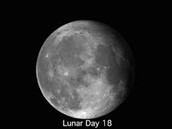 The week of October 18-24 takes us from Day 13 to 19. This week we will highlight the floor-fractured moon crater Taruntius, visible late Saturday night, Day 18.
The week of October 18-24 takes us from Day 13 to 19. This week we will highlight the floor-fractured moon crater Taruntius, visible late Saturday night, Day 18.
Taruntius: [NE/J14] Located on the north shore of Fertility, Taruntius is a wonderful example of a floor-fractured crater (FFC). Take a close look at it. Once you are familiar with the appearance of “normal” craters, you will notice right away that Taruntius has an unusually shallow basin. This is because hot magma underneath pushed upward with such force that the entire floor rose a little over a mile to its present level!
 Also notice the surrounding material that was ejected from the impact (the secondary craters) and the small crater Cameron that resulted from an object that hit precisely on the northwest rim. (Although Cameron looks small, it is nearly seven times larger than Meteor Crater in Arizona!) Cameron is a simple crater. Can you tell if it is bowl-shaped or does it have a flat floor? (In order to tell, you have to be observing when the rim shadow is crossing the floor, between 3:00 AM and 4:00 on Sunday morning.)
Also notice the surrounding material that was ejected from the impact (the secondary craters) and the small crater Cameron that resulted from an object that hit precisely on the northwest rim. (Although Cameron looks small, it is nearly seven times larger than Meteor Crater in Arizona!) Cameron is a simple crater. Can you tell if it is bowl-shaped or does it have a flat floor? (In order to tell, you have to be observing when the rim shadow is crossing the floor, between 3:00 AM and 4:00 on Sunday morning.)
OF ADDITIONAL INTEREST IN SPACE THE WEEK OF OCTOBER 18:
The Orionid meteor shower peaks early Thursday morning, but light from the Moon will interfere.
======================
It is highly recommended that you get a copy of Sky and Telescope’s Field Map of the Moon, the very finest Moon map available for use at the telescope. It is available for $10.95 at www.skyandtelescope.com and on Amazon. All features mentioned in this blog will be keyed to the grid on the Field Map and will look like this: Plato: [NW/D9]
Credits:
Courtesy of Gray Photography of Corpus Christi, Texas
Lunar photos: NASA / USGS / BMDO / LROC / ASU / DLR / LOLA / Moon Globe. Used by permission
- Rupes Cauchy: A Best Known Fault on the Moon - July 22, 2024
- Moon Crater Schickard – Crater Floor has Stripes - July 15, 2024
- Moon Craters Langrenus and Vandelinus - July 8, 2024